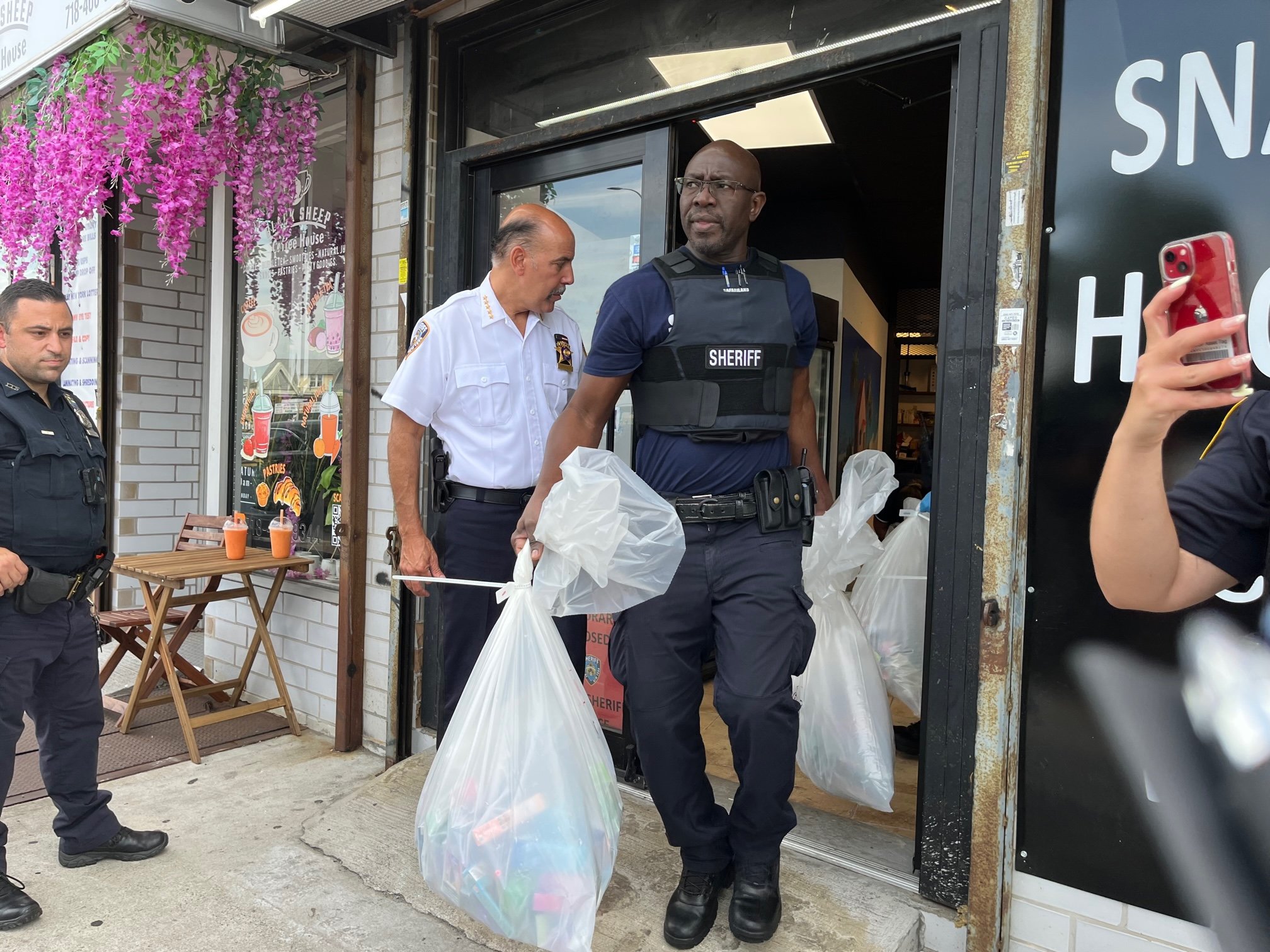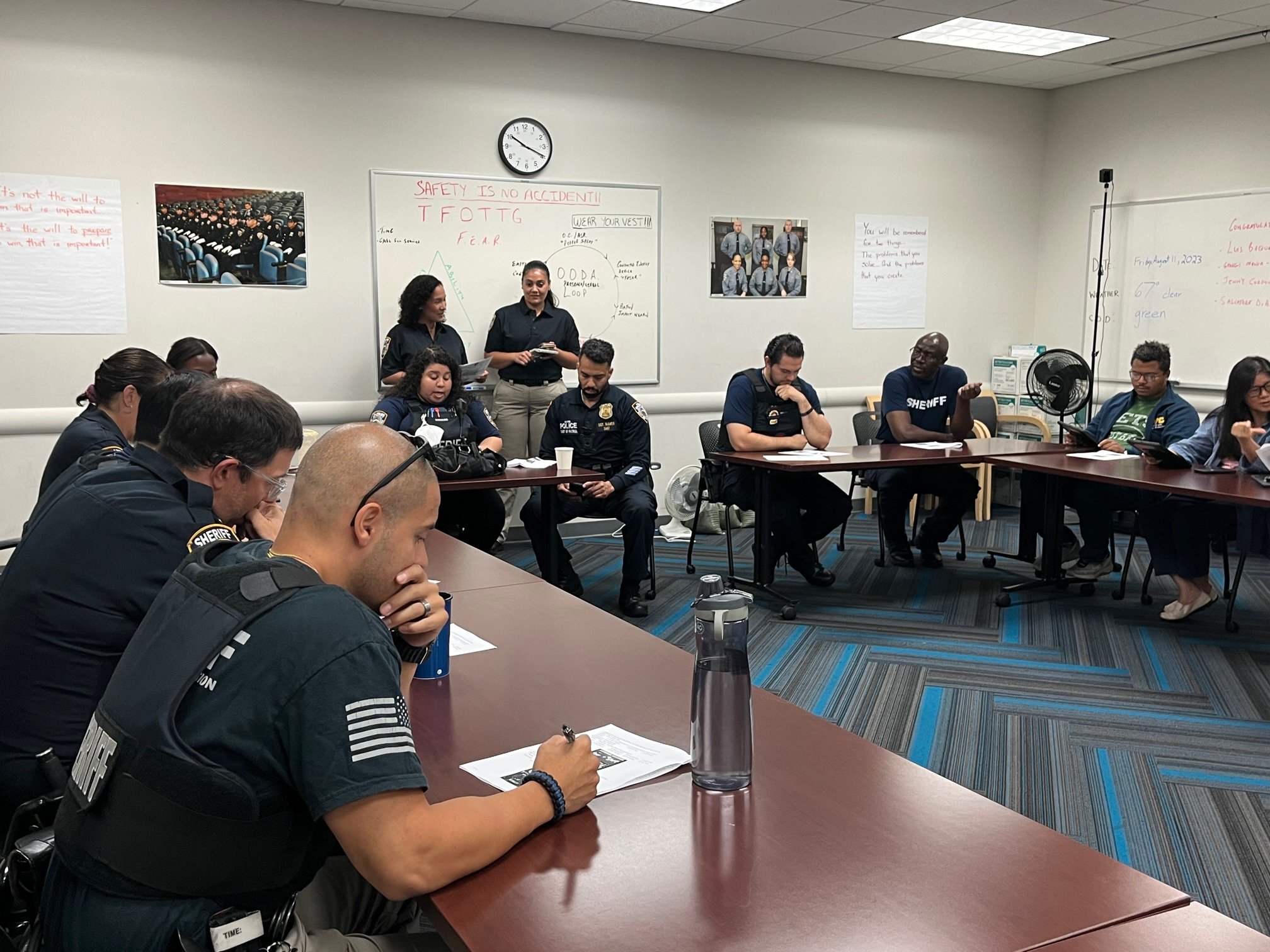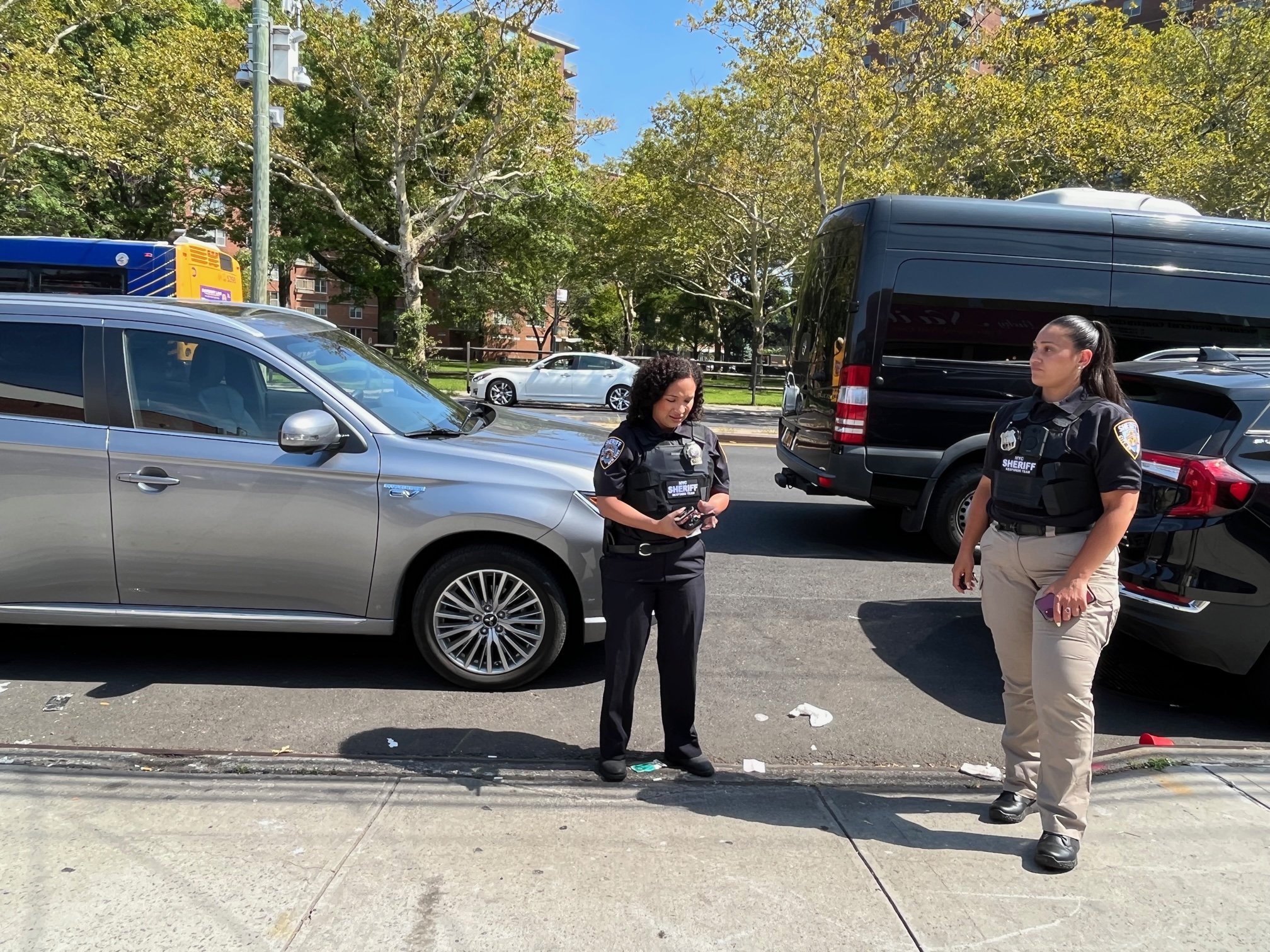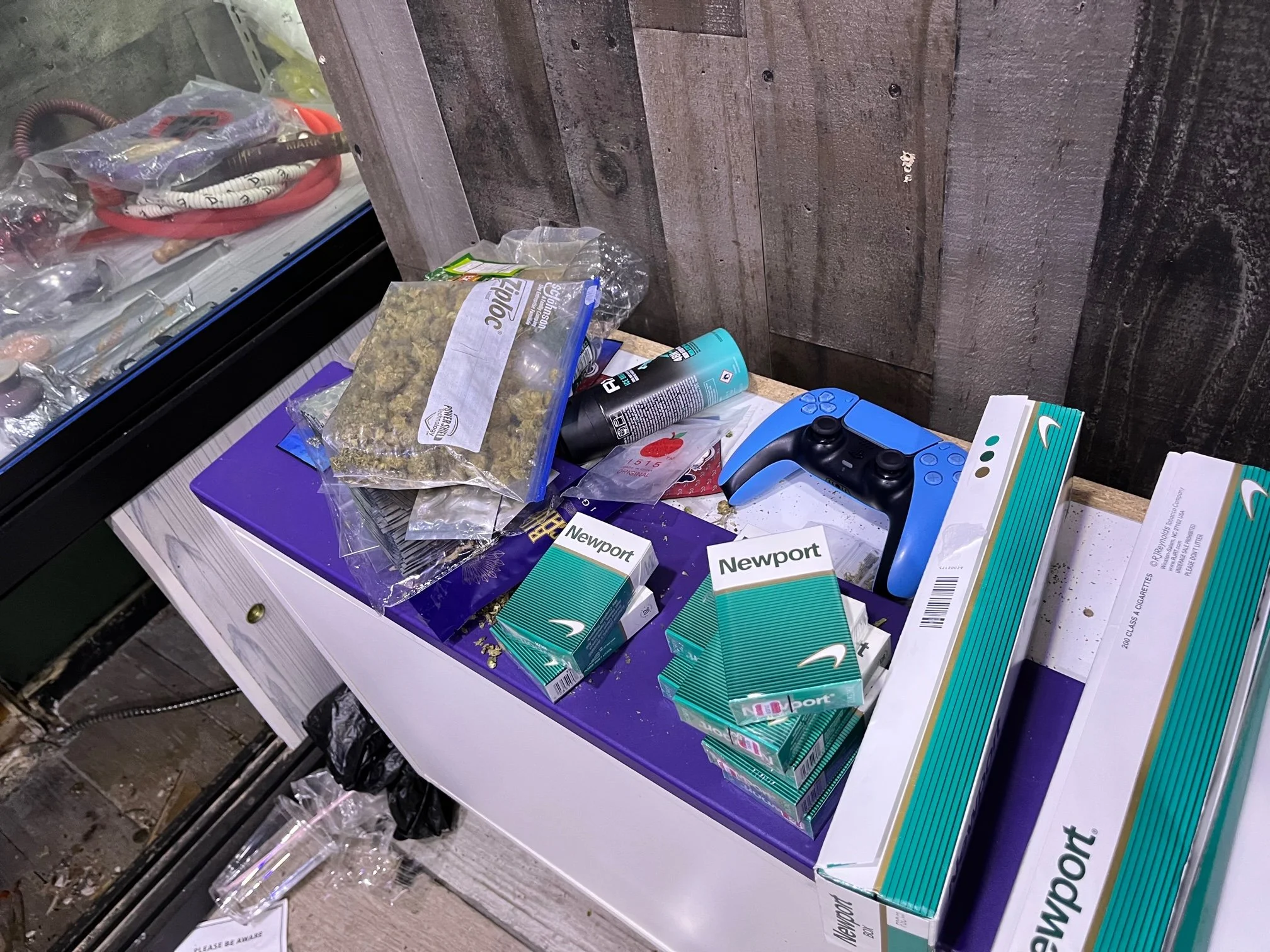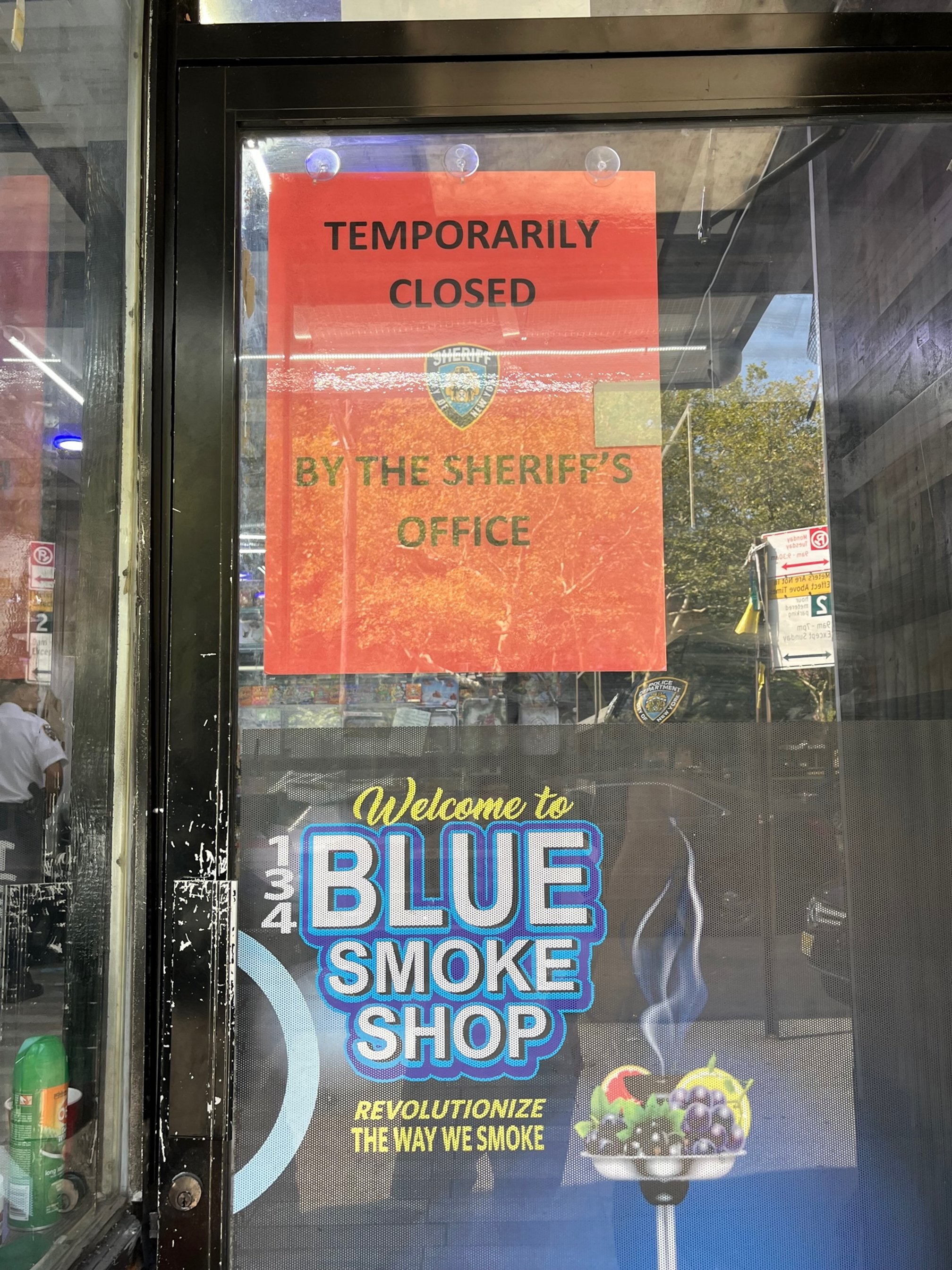Inside the city’s war on smoke shops: A ride with the Sheriff's Department
/During a ride along with the New York City Sheriff's Department, the Queens Daily Eagle got an inside look at the city’s crackdown on smoke shops in Queens. Eagle photo by Ryan Schwach
By Ryan Schwach
It is a late Tuesday morning on Starr Avenue in Long Island City, Queens. Members of three different New York City agencies sit on two L-shaped tables in a carpeted room, the words “Think Safety, Teach Safety, Practice Safety” are on a poster in the corner.
The agents, some in plain clothes, others in tactical vests, go through four locations in Queens, detailing plans, as well as why it's on the list and what they expect to find once they get there.
This tactical meeting is the first step in an average day for the city’s joint task force assigned with tackling the proliferation of illegal smoke shops and cannabis dispensaries that have cropped up across the five boroughs.
The agencies at the table are the Department of Consumer and Worker Protection, the New York Police Department and the Sheriffs Department. The four locations that were discussed are sites of potentially illegal smoke shops the team will raid this afternoon, one in Jamaica, the other three on Astoria Boulevard in the East Elmhurst area.
Earlier this month, the Eagle attended a ride along with the Sheriff’s Department, and got an inside look at the joint operation to investigate smoke shops in Queens.
Along with the rapidly increasing number of smoke shops, many of which sell illegal products, comes the task force’s growing need to prioritize certain shops in order to be effective.
“So we prioritize locations that are by schools, houses of worship, parks, daycare centers, that kind of thing,” Sheriff Anthony Miranda told the Eagle in his office on Starr Street. “We prioritize complaints where there's been reports of people being sick, and that could be young adults, children, or it can be adults as well, who get sick from the products that they're buying. Those are pretty much community complaints.”
“You need to prioritize locations, because there are things that have happened that are more sensitive to the community than others,” he added.
Miranda says that the department prioritizes complaints from the offices of elected officials as well.
“It's important to talk directly to the people, because they see more than anybody else,” he said. “They tend to share a lot of information.”
Once a location is prioritized, it is investigated and then potentially inspected.
“I should be clear that when all this is all these allegations need to be investigated, just because somebody says somebody is doing something illegal, doesn't mean they are,” said Miranda. “So it does require an active investigation to ensure and confirm what activities are being done at the location.”
Once the tactical meeting ends, and everyone knows the plans, cars and vans are assigned and loaded up.
Included in the group is the Sheriff’s Public Relations team, made up of Detective Veronica Robles and Deputy Sheriff Franchesca Rosa, who were responsible for the Eagle’s reporter.
Rosa is from Brooklyn and has spent seven and a half years with the Sheriff’s Department, and Robles has spent nine years in the department. Robles was raised in Queens’ East Elmhurst, the very community where inspections will be conducted today.
After the tactical meeting, Rosa and Robles packed into a gray Mitsubishi SUV and started towards the first location, a shop on Guy R. Brewer Boulevard, called Blue Smoke Shop, about 0.3 miles away from Redwood Middle School.
At some point along the way, the car met up with a small motorcade of vehicles on the Van Wyck Expressway, moving along the shoulder and avoiding the usual Van Wyck traffic.
“There’s a lot of moving parts for inspections,” said Rosa.
The usual inspection involves those three main agencies – DCWP, NYPD and Sheriff’s Department – but could also include FDNY, the Department of Buildings or the Department of Health and Mental Hygiene.
The tactical meeting was held at the Sheriff’s Headquarters in Long Island City, where the day’s plan was made. Eagle photo by Ryan Schwach
“From the beginning of the task force, it was a mandate by Mayor Adams to ensure that all the agencies were cooperating,” said Miranda. “His position was that if there was a problem in the city, it doesn't belong to one agency, it's a problem for all the agencies, and that we had to be working collaboratively to make sure we find a resolution solution to the problem.”
Although at points during the Eagle’s day with the task force things seemed disorganized at times, with one car not necessarily being in tune with the others, Miranda argues that it has been working.
“It's been working fantastically, because we're actually sharing information, sharing data, it helps for both inspections, and enforcement,” he said.
Today, the list of participants included elected officials as well. Miranda says that officials are always invited to inspections in their district, and on this particular day, City Council Speaker Adrienne Adams accepted such an invite.
As the squad of task force members began their inspection of the shop – which they say often begins with a plain clothed DCWP investigator getting buzzed into the store – Robles, Rosa and Miranda were meeting with Speaker Adams and members of her staff in a nearby Walgreens parking lot.
Sheriff’s Department Public Relations team,Detective Veronica Robles and Deputy Sheriff Franchesca Rosa. Eagle photo by Ryan Schwach
Adams, as well as the Eagle were eventually given the all clear to head to the location, once it has been properly secured.
At the location, an orange sign had been suction-cupped to the window with the text: “Temporarily closed by the Sheriff's Department.”
Inside, investigators loaded bags of cannabis, tobacco and other products. In a backroom, a bag of weed sat next to a Playstation controller.
Weed next to a Playstation controller in the backroom of a smoke shop on Guy R. Brewer Boulevard. Eagle photo by Ryan Schwach
Many of the packages were brightly colored, something the Sheriffs look out for, believing they are specifically designed to appeal to kids and teens.
The person who had been in the store at the time was not at the location, but his wallet was.
Once any illegal products are bagged, investigators close the shop's metal gates and move on, a notice of violation was later issued to the store’s corporation by DCWP.
This is a common “hit” for the task force, the bagging of illegal products, the issuing of civil penalties, then the court system takes over, even if the store is able to open up again.
“They can open up the next day, next week, they can open back up, they're free to open back up there again, but they have to have their due date in court,” Miranda said. “Just because we found them guilty or found them of certain violations, we issued notices, they have to have their day in court.”
This process is repeated several times a day, several days a week, Rosa and Robles say, and has been for more than a year.
“We started seeing more weed in the locations,” Rosa said, adding that cannabis in particular began cropping up and becoming the priority sometime in early 2022. “We just started encountering more cannabis,” she said.
The shops began to pop-up more frequently after weed was legalized, and the state’s rollout of legal dispensaries was slow moving. There are currently only nine legal dispensaries in the five boroughs according to the Office of Cannabis Management’s website, two of which are in Queens.
Some of these illegal store owners have argued that the waiting game to get legal licenses was too slow, something Miranda doesn’t see as an excuse.
“When you go into a location, you see that they violated all the other rules, then they can't possibly say ‘We were waiting,’ or ‘We're trying to participate in the legal market,’” he said. “Because if you were trying to participate in the legal market, you would comply with all the other rules and regulations, packaging to kids, no lights in the building.”
“If you were not trying to wait on line because you felt the process was so long, you would still be compliant with all the rules and regulations that exist,” he added.
Moving on to Astoria Boulevard, the task force moved to locations that have been getting a number of complaints to local councilmember Francisco Moya’s office.
The next location, STZ Convenience Shop, went similarly to the other, except this time, three employees were cuffed and interviewed by investigators, but none were arrested.
The inside of 21 Plus Convenience on Astoria Boulevard. Eagle photo by Ryan Schwach
The owner was given a violation for unlawful possession of cannabis.
The next planned location did not go as planned, with the doors locked and the store closed, something they see often.
Robles explained that the shops have begun warning others about nearby inspections, leading to closed doors and empty shops.
However, the third location, 21 Plus Convenience, turned out to be the most interesting for the task force, with mushrooms, a controlled substance, found alongside the usual tobacco and weed products.
The operator of that location was arrested and charged with Criminal Sale of a Controlled Substance in the 5th degree, Criminal Possession of Cannabis in the 3rd degree, Criminal Possession of a Weapon in the 4th Degree and Possession or Sale of Unstamped or Unlawfully Stamped Cigarettes.
Once the day was done, the three inspections resulted in one arrest, six notices of violations with 32 violations, 195 counts of violations, one C-Summons and an estimated $166,600 in penalties.
On top of the penalties, 26.6 cartons of untaxed cigarettes were seized, along 2,868 packages of other tobacco products, 3,302 flavored vape products, 441 THC vapes, 325 packages of THC flower weighing a total of 3.17 pounds, 747 THC pre-roll weighing a total of 1.82 pounds and 231 packages of THC edibles weighing a total of 8.09 pounds.
Even with the hundreds of smoke shops popping up all around the city, the task force believes they are making a dent, and having something of an effect.
“I think we are making an impact, the communities are seeing us out there,” said Rosa. She says that smoke shops have begun operating differently, by opening up communication and trying to maintain less than the five pound arrestable limit in the actual stores.
“They are changing the way they operate smoke shops,” she said.
For Miranda, the war continues, despite the ever growing number of potential targets.
The sign that is put up on all inspected stores that have been closed by the Sheriff. Eagle photo by Ryan Schwach
“Sure there are a lot of smoke shops open all over the city,” he said. “We'll continue to go on and inspect them accordingly.”
“If you're going to participate in that illegal part of the market, then you're going to have to suffer the consequences of your actions,” he added.

